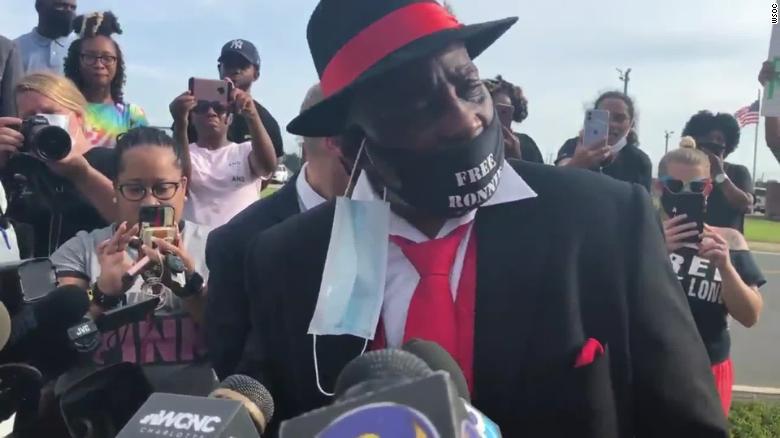Ronnie Long has been released from prison as a court has ruled to vacate his 1976 rape conviction. Long has maintained his innocence for four decades.
On Thursday, the United States District Court ordered that Long’s Oct. 1, 1976 convictions for first-degree rape and burglary and the two life sentences he received as a result be vacated.
This comes days after a court ruled Long’s due process rights were violated under the constitution when he was convicted.
Long was 20 years old when he was arrested in Concord for the rape of Sarah Bost, a 54-year-old widow. Lawyers for Long, who accused investigators of lying about evidence, have been fighting for years to right what they say was a wrongful conviction.
“This is real right here. I’m trying to enjoy every minute of it. Every minute I’ve got left in my life,” Long said.
Long offered advice to others and spoke about finally being free after 44 years of maintaining his innocence.
“Don’t ever give up. No matter how rough it can be, always believe that you can overcome it. The name of the game is surviving,” Long said. “Hopefully incidents like this can be avoided. If you see injustice being done against somebody – then speak out against it. Speak out, if you don’t then hate it, hate it with all your heart.”
“Yeah, this is the happiest news I done had in a long time,” said Long’s sister Lynda Smith. “The Long family have really had their moments, and this is lifted a big burden off of us.”

Long’s attorney Jamie Lau broke the news of Ronnie’s release on Twitter just before noon on Wednesday.
“The State of NC filed a motion with the Fourth Circuit this morning asking that it immediately issue the mandate in Ronnie Long’s case. The state said it will ask the district court to enter a writ vacating Ronnie’s conviction,” Lau tweeted, “In short, Ronnie Long is coming home!”
The attorney added that he spoke with Long Wednesday morning, and that he is “grateful, overwhelmed, and looks forward to reuniting with his loved ones.”
“Ronnie Long suffered through 44 years of injustice. I can’t imagine the strength he and his loved ones needed to endure it. I am elated that he will soon be free,” Mayor Lyles tweeted.
The United States Court of Appeals for the Fourth Circuit held that Long’s due process rights were violated by the suppression of material, favorable evidence at trial. The Court also held that the suppressed evidence could not have been discovered previously through the exercise of due diligence.
Attorneys filed a state Habeas petition, asking for Long’s release to protect his health, citing a risk while being held at Albemarle Correctional Institute. This prison has one of the worst coronavirus outbreaks in the state, with more than 180 positive tests.
“Now it is a fact that Ronnie has been incarcerated for 44 years in violation of his rights,” Lau said.
In Concord weeks ago, family and friends protested in the same city he was arrested in 44 years ago. They say he’s innocent and was wrongfully convicted. Lynda Smith told WBTV that 44 years in jail is too long for an innocent man.
“Somebody just needs to open their eyes and see. Police hid the evidence, two police lied on the witness stand. Nothing points to him and he’s still there, seems like he should be home by now,” Smith said.
Long, who is now 64 years old, previously told “48 Hours” that he never had a chance for a fair trial in what was back then a mostly segregated community.
Lau said Long, who had been a talented high school athlete, was facing a minor trespassing charge when cops asked the victim to come to court.
But the victim had originally described her attacker as a “light-colored” Black man, which Long is not. And while a shoe print found outside the victim’s home had a similar tread, it could not be matched to shoes owned by Long. There was also clothing – including a black leather coat – found in Long’s car that looked like what the rapist wore.
At trial, Long didn’t take the stand, but several alibi witnesses testified to seeing him at the time of the rape. The all-White jury convicted Long of rape and burglary. He was given two life sentences.
Bost died believing that Long was the man who attacked her, but Lau said victims can convince themselves the wrong person was their attacker.
About 30 years after Long’s conviction, his attorneys learned that investigators had tested more than a dozen pieces of evidence and had hidden the results.
The defense did not know there were 43 fingerprints found at the crime scene that didn’t match Long, as well as a hair at the crime scene that did not match Long, Lau said. They also didn’t know there was a rape kit with evidence taken from the victim.
But, in May, at a federal appeals court, the North Carolina attorney general’s office argued that none of the evidence hidden at trial would have changed the verdict. The North Carolina attorney general’s office declined to talk about the pending case.
At the beginning of the coronavirus pandemic, Long’s attorney asked Governor Roy Cooper to commute his sentence and send him home. One of the detectives in Long’s case later went to prison for stealing checks.